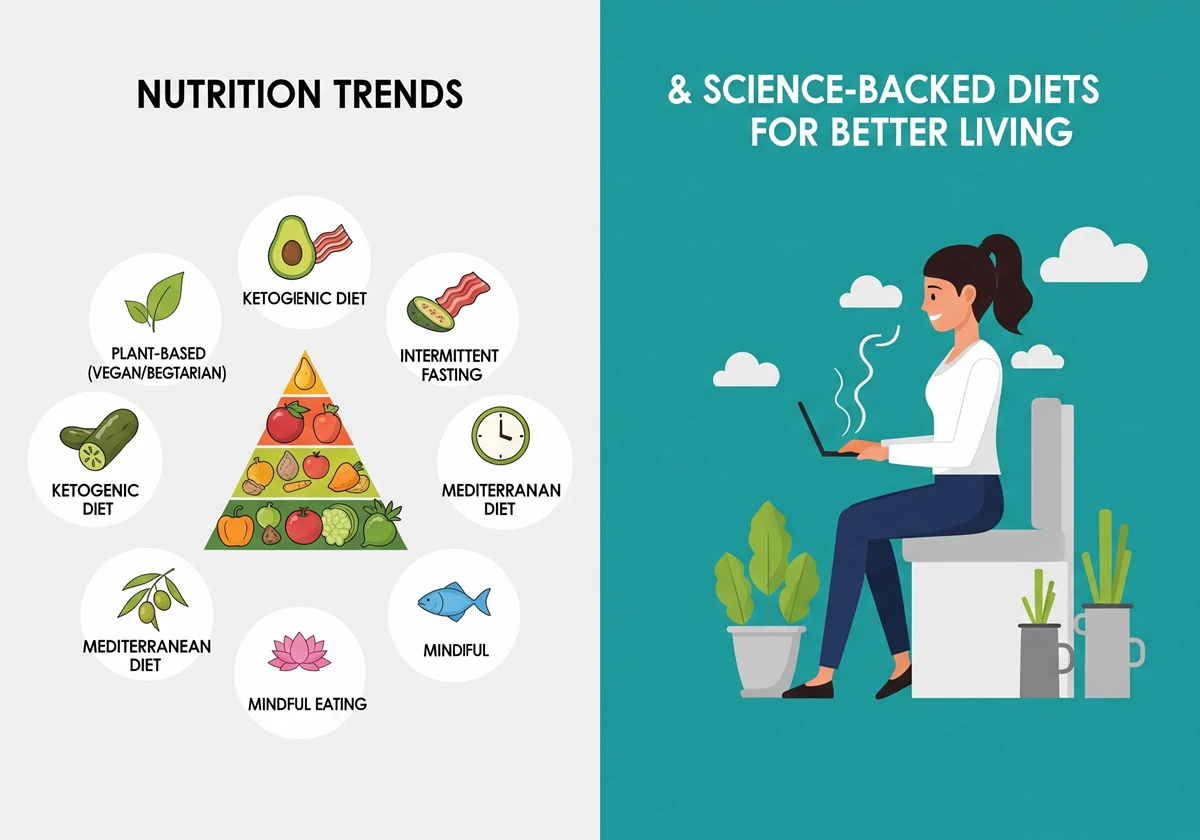Nutrition Trends in 2025-26
Nutrition is no longer just about calories and weight loss — it’s about holistic well-being, disease prevention, and sustainable living. As we step into 2025, global health experts, nutritionists, and researchers are identifying key nutrition trends that will shape the way we eat. From science-backed diets to personalized nutrition technologies, people are shifting toward smarter, evidence-based choices that support both health and the planet.
This article explores the top nutrition trends for 2025, highlighting the best science-backed diets for better living. Whether your/shared goal is weight management, energy, longevity, or disease prevention, these trends will help you make informed choices.
For related dietary guidance, see our Best Diet and Lifestyle Tips After Hair Transplant.
The world is facing rising rates of lifestyle-related illnesses such as diabetes, obesity, and heart disease. At the same time, people are becoming more conscious about climate change, food sustainability, and overall wellness. Nutrition trends in 2025 are influenced by: The good news is that most of the diet trends trending in 2025 are science-backed, ensuring they go beyond fads and actually improve well-being. Explore protein-rich options to complement these nutrition trends in our Top Delicious High Protein Foods for a Healthy, Balanced Diet. Ranked consistently as one of the healthiest diets in the world, the Mediterranean diet will remain a dominant trend in nutrition trends for 2025. Backed by decades of research, it emphasizes: Health Benefits: Improved heart health, reduced risk of type 2 diabetes, and enhanced brain function. The global shift toward plant-based eating continues. However, the flexitarian diet (a mostly vegetarian diet with occasional meat/fish) is gaining traction in 2025 as a balanced approach within healthy eating trends. Why It’s Trending: With diabetes and metabolic health concerns on the rise, low-GI diets are among the fastest-growing nutrition trends. These diets focus on foods that release glucose slowly, preventing sugar spikes. Best Foods: Health Benefits: Stabilized energy, better weight control, and improved insulin sensitivity. Fitness-conscious individuals are prioritizing high-protein diets paired with smart carbs like sweet potatoes and brown rice. Unlike extreme carb-cutting, this approach balances energy and muscle maintenance, making it a key part of nutrition trends. Trending Sources in 2025: Thanks to AI and biotechnology, personalized nutrition is taking off in 2025, shaping modern diet trends. Apps and DNA testing kits now provide diet plans tailored to: Example: A person with a genetic predisposition to high cholesterol may receive a custom meal plan limiting saturated fats and processed foods. The idea that overall health is rooted in the gut is increasingly relevant today. Diets focusing on probiotics, prebiotics, and fermented foods are trending because of their impact on digestion, immunity, and even mental health, aligning with nutrition trends. Popular Foods in 2025: Beyond personal health, diets in 2025 are focusing on planetary health, a core aspect of nutrition trends. Sustainable eating involves: This aligns with the global movement toward climate-conscious living. In 2025, functional foods and supplements are growing as add-ons to science-backed diets, reinforcing healthy eating trends. Examples include: For additional health-focused nutrition tips, check out our Fitness Trends in 2025. While many diets are science-backed, not all nutrition trends are safe. Some risks include: For hair health-specific nutrition, see our 10 Best Natural Hair Growth Treatments in 2025-26. The Mediterranean diet remains the gold standard, backed by the most scientific evidence for longevity and overall health in nutrition trends. Not always. Plant-based diets are excellent for health and sustainability, but balanced flexitarian diets also provide flexibility and nutrition, a key aspect of diet trends. Yes, but it’s still evolving. Personalized diets can provide valuable insights, but lifestyle choices matter just as much in nutrition trends. Highly processed foods, sugary snacks, refined carbs, and excess red meat remain top “limit” foods in healthy eating trends. No. Supplements should only fill nutritional gaps, not replace whole foods, according to nutrition trends. This article is for educational purposes only. It highlights general nutrition trends in 2025 but should not replace professional medical or dietary advice. Always consult with a qualified nutritionist or healthcare provider before starting a new diet or supplement plan. For additional health insights, visit Healthline’s Nutrition Guide.
Why Nutrition Trends Matter in 2025-26
Top Science-Backed Diets Driving Nutrition Trends
The Mediterranean Diet – Leading Nutrition Trends
Plant-Based and Flexitarian Diets in Nutrition Trends
Low-Glycemic (Low-GI) Diets Among Nutrition Trends
High-Protein and Smart Carb Diets in Healthy Eating Trends
Personalized Nutrition & DNA-Based Diets in Nutrition Trends
Gut Health and Probiotic Diets in Healthy Eating Trends
Sustainable & Climate-Friendly Diets in Nutrition Trends
Functional Foods & Supplements in Nutrition Trends
Risks & Myths to Avoid in 2025 Nutrition Trends
Expert Tips for Adopting Healthy Eating Trends
FAQs on Nutrition Trends 2025-26
Q1. What is the healthiest diet in 2025?
Q2. Are plant-based diets better than non-vegetarian diets?
Q3. Is DNA-based nutrition reliable?
Q4. What foods should I avoid in 2025?
Q5. Can supplements replace a healthy diet?
Disclaimer
